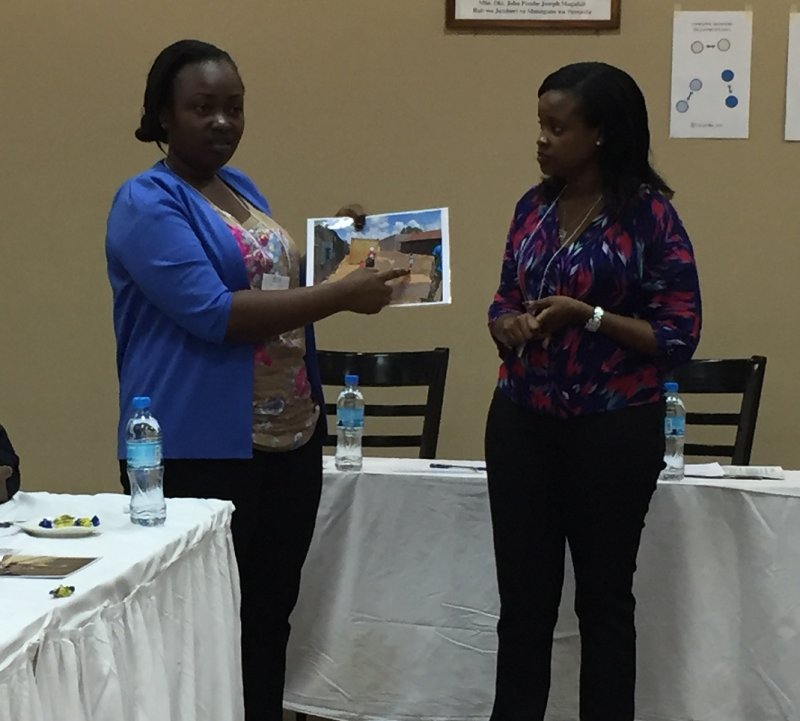A Growing Community for Knowledge Management in Africa
This reflection was originally posted by K4Health on May 10, 2016. It is the third of a three-part series of posts on the K4Health Knoweldge Management Share Fair in Arusha, Tanzania in April 2016. Read Wycliffe Omanya and Courtney Calvin's reflections from the event.
As a communicator and advocate in public health, I’ve learned that in order to strengthen or change policies and practices for better health, it is critical to ensure that knowledge about what does and doesn’t work is effectively and systematically captured, disseminated, and applied. Through my work, I am constantly reminded of the interconnectedness and catalytic relationships between strong knowledge management (KM), effective communications efforts, and successful advocacy.

It is for this reason that I was excited to participate on behalf of the African Strategies for Health (ASH) project in the East, Central and Southern Africa Health Community Knowledge Management (KM) Share Fair in Arusha, Tanzania a few weeks ago. The Share Fair was hosted by USAID, the K4Health Project, and two African regional organizations: the East, Central, and Southern Africa Health Community (ECSA-HC) and the East African Community Lake Victoria Basin Commission (LVBC).
I was excited to have the opportunity to connect with regional partners and the nascent KM community across East, Central, and Southern Africa; learn about their efforts in KM and strengthen dialogue and collaboration around technical topics; and explore new tools and tactics for good KM.
KM across East Africa
African regional bodies have played an increasingly important role in health and development across the continent. Regional networks and associations often cite knowledge exchange, capacity building, and advocacy as their main objectives, and closely follow current trends and knowledge about health in order to disseminate information, monitor the delivery of services, represent the voice of the community, or advocate for improved policies and practices.
The Share Fair demonstrated how ECSA-HC and LVBC are working towards these goals. The meeting brought together 102 participants from 14 African countries, and included country government representatives as well as members of regional organizations and institutions such as the USAID East Africa Regional Mission and theAfrican Population and Health Research Center (APHRC). The meeting helped foster a community for KM in Africa, and established an online platform—spearheaded by ECSA-HC—to support and connect with colleagues across the region.
KM Tools and Tactics
Throughout the two days, we learned of innovative and practical tools and best practices for strong KM. Two of these struck me as particularly important because of their intersections with communications and advocacy. The first, Photovoice, is an innovative way to engage community members in telling their stories through their own eyes by asking them to photograph their perspectives around specific questions such as, “What barriers do you, a mother in an urban slum, face when seeking balance between employment and child care?” The photos are then used to promote dialogue between these community members and researchers or program implementers, and to enhance processes along research or program implementation. Net-Mapping, another great KM tool, is used to explore common patterns of connections between people to better understand and impact the ways they communicate and ultimately work together.
Ensuring effective communications and advocacy programs requires a deep understanding of the issues and how to apply this knowledge to achieve a desired outcome. I am encouraged by the emergent attention and resourcing of KM across the East African region. The active participation in this forum is clear evidence that global health practitioners across East Africa are interested and excited about using KM to improve both short- and long-term development outcomes (check out #KM4Africa).
Looking forward, the global community has important opportunities to use KM in their own work as well as to use KM practices that support transparent and collaborative engagement in many important gatherings. Thanks to this Share Fair, I look forward to becoming a KM champion in my own way and helping, along with all the other Share Fair participants, to build a culture of knowledge sharing and learning from each other’s experiences.
Photo: In a knowledge café session on storytelling, Stella Muthuri engages participants in a discussion about the vibrancy and value of Photovoice as a KM storytelling practice. Photo by Willow Gerber.



